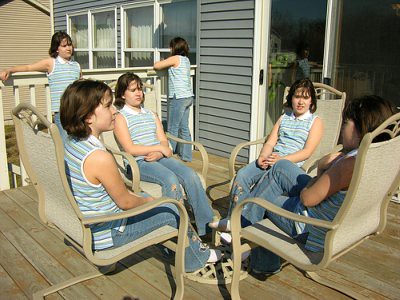I am currently reading a book by Jay Haley about the work of Milton Erikson. It’s a summation of the work of Erikson. Haley was probably trained in psychoanalysis because in his writing there are a number of references to how it is not necessary look at the past, what a therapist deals with is what the client presents now. There is a flavor of rebellion against the psychoanalytic approach in this way.
This leaves one with a telling question: if you don’t go back to the past of the person what do you do? He suggests a short term, here and now approach that is family therapy oriented.
However one thing I have discovered that was somewhat insightful for me, is one of the greats of family therapy - Milton H. Erikson - rarely saw the whole family together. What he did see was various family members alone or in various combinations separately.
This is what I have done over the years even though I never considered myself a true family therapist because I rarely saw the whole family together. Now I discover to do family therapy you do not actually have to see all the family together. In my book working with drug and alcohol users I spend significant time discussing therapy with the teenage drug user and this is exactly the approach I describe when I work with them. You see any person in the family who becomes relevant to the issue at hand and in any combination that is relevant.
Family therapy
In essence I am doing family therapy but I certainly diverge from Erikson and Haley in that I will and regularly do delve into the past and individual psychology of the various parties. However this ‘discovery’ has solved another problem for me as well.
Some counsellors have a rule that if you see a couple then you cannot see either party in individual counselling. Or if you see an individual then you cannot also start seeing them and their partner for couples counselling. I (along with other therapists I may add) have never adhered to this view but some can get quite hot under the collar about it all and start saying things like it is unethical and so forth.
Well know I have theoretical back up for it all. I am doing family therapy Milton H. Erikson style, which is true, I am.
Body dysmorphia
However I have digressed from the point at hand
When working with an adult client at some point I always ask myself the question -why now? Why has the client sought psychological help now and why not 5 years before or in 5 years time? If there has not been a specific event that has resulted in the client attending counselling why has the client appeared now? The answer to it can of course be related to developmental psychology. The person has reached a particular developmental stage in the human life cycle and it is causing difficulties for them.
Developmental psychology
There has been a huge amount written on this area with a prime example being Freud. This chart summaries Freud’s theory of the psychosexual genesis
It shows the different developmental stages a child goes through and isolates the the developmental tasks it has to master. Most notably the oral, anal and phallic stages. Although the latency, eurethral and genital stages are added here most of the emphasis is on the pre latency stages. As a child goes through each of the stages they effect its personality development and the person becomes who they are. We all get fixed to some degree in the oral, anal and phallic stages.
The two charts below show what can happen if a person is fixated at the oral stage of development. It is divided into the oral sucking and oral biting stages. If unsuccessfully mastered the person can develop things like eating disorders or addictions especially an addiction to cigarettes.
***
In the second chart the top two rows relate to oral sucking and the bottom two rows relate to oral biting.
Whilst this is all good and well it only relates to childhood. In one way this is logical as it is during that stage that we develop the basis of our personalty. By adulthood most theories of child development agree that the personality is formed and in most instances after that time little extra change occurs.
However that does not mean there are not subsequent stages of development to master. Just like the child has to master the oral and anal stages of development the adult also has to successfully move through various stages. Thus we have the following equations
Childhood stages = master the stage and major impact on personality formation
Adulthood stages = master the stage and minor impact on personality formation
Throughout history these adult stages of development have been the poor cousin in developmental psychology. Not much has been said about them and they are by and large ignored or at least viewed as much less important than the childhood stages of development.
When adult stages have been discussed people often gravitate to the theories of Erik Erikson (No he wasn’t Milton’s brother!). A summary of Erik Erikson’s theory of development called the eight ages of man, is illustrated below
As one can see it covers the whole life span from birth until the end of life in old age. The last three are the adulthood stages of development. He saw each stage as being a ‘battle’ between two possible outcomes. For instance in the stage he calls Adulthood he sees the goal for the individual to develop generativity versus a state of stagnation.
In generativity the adult person seeks to establish and guide the next generation including things like productivity and creativity. He says in this way the mature person is dependent on the younger generation. The adult person needs to be needed and this need can be satisfied by guiding the young. If this is not achieved then the adult person will suffer a pervading sense of stagnation and personal impoverishment.
I find this a reasonably good statement but to me it lacks substance. It would be good for the adult person to become a guide and teacher for the young but is that it! Is that the one and only developmental task the adult person is meant to master? And from a therapeutic point of view, if one has a client who is 40 years old how is this idea of generativity vs stagnation meant to help. To me it is too esoteric in this way.
There needs to be more and by and large developmental psychology has failed in this way. Hence I arrive at Milton Erikson and Haley and what they developed. As mentioned before they refused to delve into the past unlike the majority of developmental psychology and therapeutic approaches. In my view this was a counter reaction away form the psychoanalytic philosophy of Freud.
I stated before, “if you don’t go back to the past of the person what do you do?”
As a result of this philosophy they were forced to construct a developmental theory of adulthood that was based on a behavioral understanding or focus. They developed a therapy that was short term solution focused, oriented primarily to behavioral change in how the family members related to each other.
This theory came from a clinical therapeutic basis, meaning it will tend to be readily applicable in the therapeutic setting unlike Erik Erikson’s theory. As this evolved out of their own experience with clients it meant it was their observations of a large number of clients. They were starting to identify where people tended to have problems as they moved through their adulthood. They were identifying the times (or stages) when adults had to master new tasks as a result of their increasing age.
But they kind of did it back to front. Instead of saying OK a child has to learn how to breast feed successfully whilst relating to mother, therefore the first developmental stage is the oral stage. If it does not successfully master this then the problems it will have are....
In this case they were identifying the developmental stage first which then subsequently led to the formulation of the problems relevant to that stage.
Instead Milton Erikson and Haley said, “I observe that children who present with problems seem to have difficulty leaving the parents and the home.”
In this instance first they identified the problem which subsequently led to the formulation of the developmental stage
In essence they came up with a developmental theory of adulthood by accident.
Adulthood developmental stages
The courtship period developmental task - establish a long term relationship with a mate.
Being a social person as an adult developmental task - establishing a social world external to the family of origin and some what external to the mate.
Getting married developmental task - make the decision to enter into a marriage type relationship.
Dealing with childbirth and young children developmental task - coping with and mastering the difficulties of raising young children
The middle years of marriage developmental task - between 5 to 15 years of marriage when divorce tends to happen due to the change in perception of marriage by one or both parties.
Parents letting children leave home developmental task - parents being able to wean self off children and let them move away.
Resolving the movement into old age developmental task - mastering coping with changes in the body and accepting death as a matter of course.
An interesting collection of stages that are directly applicable in counselling. If a 25 year old female presents with agoraphobia the question must be asked, “Is she successfully mastering the courtship stage developmental stage”? As I have said before sometimes it’s clear that family dynamics are involved and at other times they are just not relevant and then one moves to an individual past oriented approach to the counselling.
Graffiti








I do understand your critique about generativity-stagnation being abstract.
ReplyDeleteBut Milton and Haley's has the reverse problem: what if a person doesn't want to get married?; what if a couple can't have kids? Does this mean they can't become a mature adult?
I think generativity-stagnation probably could cover the task of that stage (and other stuff be due to past stages or not relevant to maturity).
My difficulty with the adult stages of development is the time line. I wonder if they have to occur in the order prescribed - especially intimacy and generativity and I don't see why a concern for ego integrity can't occur just about anywhere.
Hi Evan, thanks for your comment.
ReplyDeleteIn terms of timeline and so forth Milton and Haley never tired to do that. They never presented this as a theory of the developmental stages of adulthood. That is my creation as I develop the stages from what they have presented in various parts of their writing. It is quite possibly not complete as well.
Yes the time variations can be enormous and there are significant variations amongst cultures. In some cultures women are meant to be married and have a first child be age 17 whereas in Australia that can happen when the woman is 40. I plan to go into more detail as I develop it.
There are also the other points you make. Some people chose to be single, some chose not to have children, and what about same sexed relationships. Have these people failed in their adulthood development? As you can imagine very thorny issues to discuss. As I said before Milton and Haley never addressed any of these because they never presented this as a theory of human development. Tony